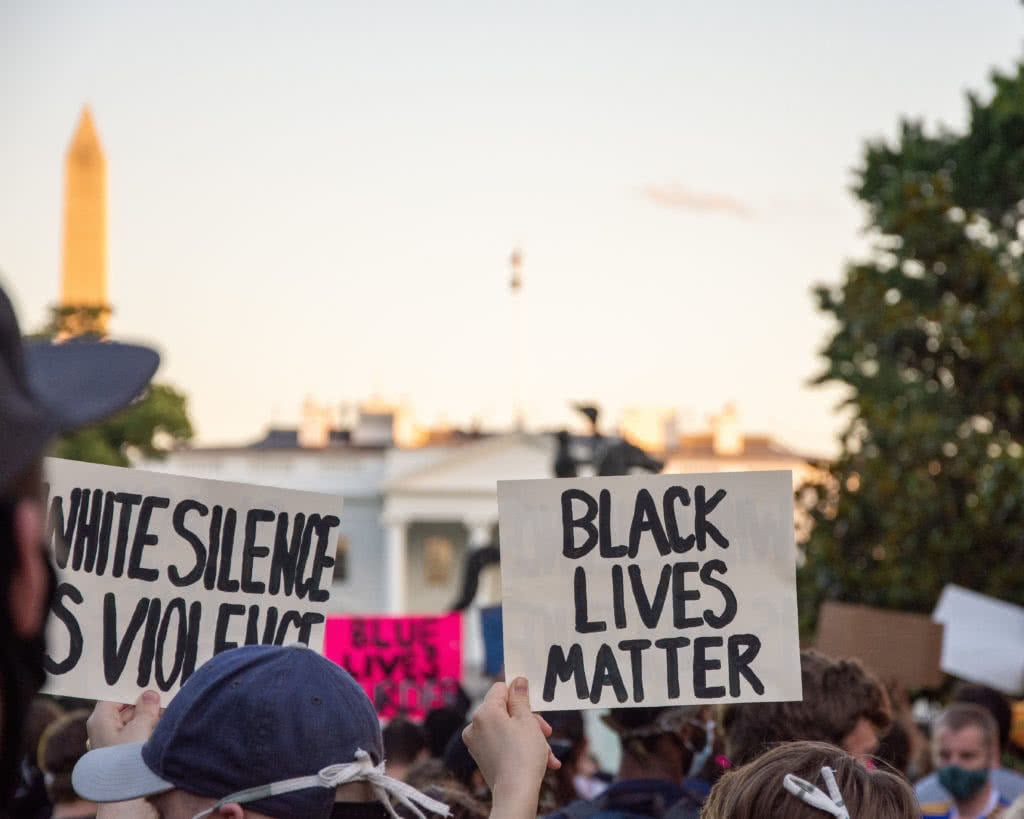How To Take Control Of Anxiety When You Can’t Stop Thinking About George Floyd and Racial Injustice

Who, these days, is not walking around, traumatized by the video of George Floyd’s murder? To say nothing of the painful realities of systemic racism, police violence, and protracted racial injustice once again brought to the surface. Appalling. Scary. Disgusting.
That our country still harbors such extreme racism feels too much to swallow. And with a week of protests and political upheaval – all amidst COVID-19 lockdowns and fears – it feels like our country is breaking at the seams.
We don’t know quite how to respond. How can we deal with all that’s going on outside, while still being warned to stay inside? Depending on where you live, if you’re not self-quarantining, you might have been under curfew. This is not a situation most Americans have ever, ever dealt with.
You might feel angry, guilty, or stunned at what happened. Nauseated from that video. Nauseated by the political response. Nauseated by the evolving fallout. The barbaric murder, the complicit bystanders, the delay to justice, the systemic racism. To watch these unfolding events is to be left with a hole in our hearts from this tragedy, and it isn’t hard to wonder what we can do.
When we feel like we have no recourse, it’s time to take a step back, and pause.
Our emotions can become overwhelming if we don’t know how to sort them, much less what to do with them. This can happen when we feel powerless over horrible events we can’t control. It can help to remind ourselves that we will feel better when we can direct our anxious feelings into helpful action, even if that simply means showing more love and compassion to the people in our homes, and communities.
We can educate ourselves, we can be active on social media, we can advocate, or we can choose not to participate publicly, take a media break, and continue quiet reflection. What we do is less important than the decision to do something. We. Have. Choices.
Exercising our choices is how we engage, channel our anxiety, and take control. There is no one right way to respond, no one right thing to do. But there are many helpful lists and options being suggested (some of which I will list below) to help us all do better at fighting racial injustice.
For all of us, what we do with our emotions will be different. The key is to tap into what your particular anxiety is trying to tell you, and do something with it that is within our control, and productive. It can be as small or as big as you want it to be. This will help you maintain the balance you need to move ahead.
When tragedy strikes and racial injustice once again flares its ugly head, finding your emotional balance is the key first step. This is not a time for shame, blame, or guilt. These emotions further anger, resistance, and fatigue progress. Rather, a mindset of compassion and growth, can help expand your bandwidth and find the positive opportunities for change.
Fighting without hate is the goal now, and it will take determined courage and strength to get there.
_______
To learn more about racism and how you can help, Berkeley’s Center for The Greater Good has an excellent list of anti-racism resources designed to facilitate learning, self-reflection, bridge-building, parenting, and education.
For mental health services targeted at the effects of racism, this is an excellent resource guide for Black, Indigenous, and People of Color (BIPOC)
For help in talking to children about racism, Karen Young’s guide is organized by age and is the best I’ve seen so far.
For ideas about lending your voice to anti-racism initiatives and promoting racial justice, this medium article has a variety of suggestions and has been widely circulated.
Tara Brach outlines four key steps to cultivate a courageous presence with racism.
Finally, there are many worthy organizations tirelessly fighting for racial justice all over the world, that offer opportunities to get involved and financially support their missions. While by no means exhaustive, this is a good list of organizations.
_______
For more help managing anxiety and learning to use it as a tool, check out my book Hack Your Anxiety and the online digital tools I’ve developed here, or sign up for my free mini e-course here.